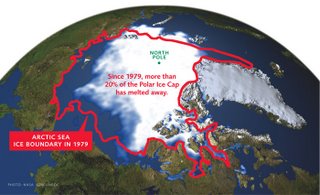Globalization and Global Collapse

I don’t know how much to feel disheartened by John Gray’s excellent article in the April 27 issue of the New York Review of Books. It’s a “good news/bad news” kind of report that gives the good news first. Gray covers three books on globalization by Daniel Cohen, Suzanne Berger et al, and Barry C Lynn, paying most attention to Cohen.
Here’s the good news – and it’s probably true. Contrary to widespread popular belief, the world is not converging toward a single unified type of economy. It never was converging, and today’s rapid globalization does not mean that it is now either. Different societies are different. Moreover, there’s not a single type of economy that is so much better than all the others that the whole world will have to adopt it just to keep up. One the contrary; societies continue to differ, and so do even corporations. For example, some successful corporations outsource most of their production, while other companies manage the whole operation from start to finish. It’s not clear that one style is superior to the other.
Gray accepts Daniel Cohen’s opinion that the whole globalization kafuffle has been overblown anyhow. Tradehas indeed expanded during the last thirty years, but most of it is between rich countries. Global trade is beneficial economically, but it is the rich who are trading and benefiting. Regrettably, globalization is not helping economic development in the poor countries much. Those countries are remaining poor because they have so little that rich countries want to buy. He writes,
“The poor of the world are not so much exploited as neglected and forgotten. At the same time the press and television are drenching them with images of the riches they lack. For the poor, globalization is not an accomplished fact but a condition that remains to be achieved. The irony of the current phase of globalization is that it universalizes the demand for a better life without providing the means to satisfy it.”
This may not sound to you like “good news,” but I think it is. What Gray is accepting here is Cohen’s opinion that globalization is a good thing, though many people assume otherwise. Or rather, it would be a good thing if it were to happen to the poor of the world, which so far has not occurred.
The bad news is, as Gray points out, that it is never going to occur. He criticizes Cohen for omitting an adequate recognition of the limitations imposed by geographical and climatic factors. The depletion of natural resources, the growth of population, and the melting of the polar ice caps will mean that the poor of the world can never catch up with the rest of us – and indeed that we rich folks are going to become less prosperous as well.
This is very bad news indeed – especially since Gray believes that it is inevitable. Nothing is going to replenish the fossil fuels that have made industrialization so efficient. Indeed, despite his admiration for Cohen’s upbeat thesis, Gray criticizes his conventional economic belief that innovation in a market economy will save us all by creating new solutions to our material problems. The impending fossil fuel depletion would be enough to cause a crash, and even if it were not looming in the foreseeable future, the global warming that these fuels cause will wreak havoc. We can’t win.
I don’t disagree with Gray (I wish I could) and the strongest argument that I can marshal against him will not provide any hope that his pessimism may be unwarranted. We have to acknowledge, I think, that the planet’s physical limitations are going impose painful constraints on our standard of living.
My only question about this article is conceptual, not substantive. That is, I think Gray may be mixing up to historical phenomena that are really different processes. What is globalization? Is it necessarily the cause of the world’s geographical and climatic crisis?
To be sure, industrial production and the consumption of scarce material resources are the cause of the impending crisis. But international trade is what we mean by globalization. It is conceivable that the world might industrialize on a fairly local basis without increasing international trade at all. In fact, the socialist countries were doing so throughout the cold war. Industrialization was using up natural resources and heating up the atmosphere, even in the absence of globalization. Our wasteful lifestyle, not international trade, is causing the environmental crisis.
Still, that distinction is mere hair=splitting if we are going to collapse anyway because both of them are occurring together. Halting globalization, even if it could be done, would not solve the problem. Let’s hope that Cohen, not Gray, is right, for the only promising help must come from innovation. Nothing else is left to hope for.



2 Comments:
I hope he's right, Ted. Of course, no one "knows" what's so -- and we probably won't know until we're in a catastrophic situation. Once you've run out, that's irreversible. What I've read projects a different picture from the one you accept.
He's right that the global warming problem is the "other bookend." That is, even if there's enough fossil fuel energy around, we don't dare use it recklessly because it causes global warming. And of the global warming, there is more genuine evidence. The map that I inserted at the beginning of the blog is enough evidence for me.
I don't like to criticize you for being an ostrich, but it seems to me that this issue is absolutely too important to allow anyone to properly coast along, hoping things will work out according to the most optimistic projections.
Ted-
I looked up Robert Bradley of the Energy Institute. It appears he was previously Director of Public Policy Analysis at Enron, where he wrote speeches for Kenneth Lay. Hmmm...
Best Regards,
Steven Wagner
Post a Comment
<< Home